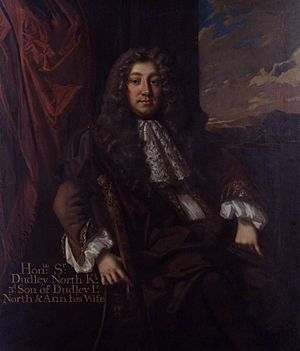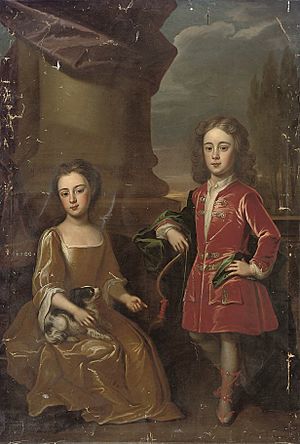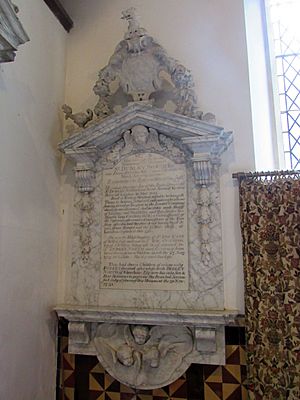Dudley North (economist) facts for kids
Sir Dudley North (born May 16, 1641, in Westminster; died December 31, 1691, in London) was an important English merchant, politician, and economist. He also wrote about the idea of free trade, which means letting people buy and sell goods without too many government rules. He was part of the well-known North family.
Contents
Sir Dudley North's Life Story
Early Years and Family Connections
Dudley North was the fourth son of Baron Dudley North, 4th Baron North. His mother was Anne Montagu. When he was very young, he was briefly taken by Gypsies, but his family quickly got him back. He had two famous brothers: Francis North, 1st Baron Guilford, who became a top judge called the Lord Chancellor, and Roger North, who was a lawyer for the Duke of York (who later became King James II). His nephew, William North, 6th Baron North, was a military leader who fought alongside Prince John Churchill, 1st Duke of Marlborough at the famous Battle of Blenheim.
Becoming a Successful Merchant
Dudley North started his career in foreign trade. He spent many years in places like Constantinople (now Istanbul) and Smyrna (now Izmir) in Turkey. He became very successful and returned to London with a large fortune. He continued to trade with the Levant, which is the area around the eastern Mediterranean Sea.
Joining the Government
Because he knew so much about business and trade, the government noticed him. His brother, Lord Guilford, also helped him get attention. During the time of King Charles II, Dudley North was made one of the sheriffs of London in 1683. This was a time when the king wanted to make sure court decisions favored the crown.
In 1683, he was made a knight, which means he was given the title "Sir." He then worked as a commissioner for customs (collecting taxes on goods coming into the country) and later for the treasury (managing government money). He also served as a commissioner for customs again.
Serving in Parliament
In 1685, under King James II, Dudley North was elected to Parliament for the area of Banbury. His brother, Roger North, said that Dudley became the main person in charge of all money matters for the king in Parliament.
After the Glorious Revolution, which was a big change in how England was ruled, Dudley North had to explain his actions as sheriff. People questioned if he had acted fairly. He was buried in St Andrew's Church in Little Glemham, Suffolk, where a memorial honors him.
Sir Dudley North's Family Life
Sir Dudley North married Anne, who was the daughter of Sir Robert Cann, 1st Baronet. Anne was also the widow of Sir Robert Gunning. They had one son who lived to adulthood, also named Dudley North. This son inherited the family estate at Glemham. He married Katherine Yale, whose father was Governor Elihu Yale, the person for whom Yale College (now Yale University) is named.
Sir Dudley North's Economic Ideas
Understanding Discourses upon Trade
Sir Dudley North wrote an important book called Discourses upon Trade in 1691. He published it without his name on it. This book talked about important economic ideas like interest rates, money, and how trade works. It was later republished in 1856 by J. R. McCulloch.
In his book, North strongly supported the idea of free trade. This means he believed there should be fewer rules and bans on buying and selling goods. He argued against the old idea that a country's wealth only came from having a lot of gold or silver. Instead, he said that true wealth comes from people's hard work and effort, whether they are farming or making things.
Key Ideas on Trade and Wealth
North explained that if trade seems slow, it's not because there isn't enough money. It's usually because there are too many goods in the home market, or problems with foreign trade, or people don't have enough money to buy things. He believed that when a country sends its money out to buy goods from other countries, it actually helps the country get richer. He saw trade as a way for countries to exchange things they have too much of.
He also thought that countries are like cities or families. They all benefit from trading with each other. North also stressed how important trade within a country is, not just trade with other nations.
Thoughts on Interest and Prices
Sir Dudley North had clear ideas about interest rates, which is the cost of borrowing money. He said that interest rates, just like the price of anything else, depend on how much money is available to lend and how many people want to borrow it. He believed that low interest rates happen when there is a lot of money available to lend, not because the government forces them to be low. He disagreed with people like Sir Josiah Child who wanted the government to set interest rates.
North also argued that giving special advantages to one type of business over another actually hurts everyone. He felt that all trade is good for the public. If a trade wasn't profitable, people would stop doing it. When businesses do well, the public also does well because they are part of it. He believed that prices should be set by the market, not by laws. Any time the government tries to control prices, it causes more harm than good.
In summary, Sir Dudley North believed that countries become rich not by government rules, but by having peace, working hard, having freedom, and letting businesses operate without too many limits. Because of his important ideas, the economist Wilhelm Roscher considered him one of the top economists in Europe during the 17th century, alongside John Locke and William Petty.
 | Jewel Prestage |
 | Ella Baker |
 | Fannie Lou Hamer |




